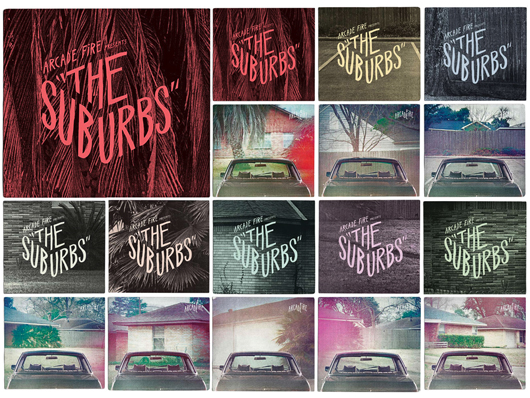
Introduction
When Arcade Fire first gave the world a sneak of The Suburbs back in May it seemed as if they were trying to do it without anyone noticing. Releasing a 12” single only in select independent record stores, giving very little away in terms of interviews or press, it felt like the band were trying to avoid the inevitable hype.
Of course, when you’re a band like Arcade Fire, whose debut album Funeral was a critical and commercial smash way beyond anything that was expected of it, everything that follows is going to emerge in a tidal wave of hype. And trying to live up to that is always going to be a difficult task.
So what do you need to know about The Suburbs? First up, it’s a bit of a concept record. No surprise there; pretty much everything the band have done in the past has had some kind of theme running through it (death in particular has always been a topic of choice for them).
This third album takes in a lot of themes - the alienation of modern living, the bleakness of suburban life, a critique of the hipster lifestyle - it’s all in there somewhere.
It’s also a bit of an epic. At 65 minutes and 16 tracks The Suburbs is no mini-album.
So how does it sound and how does it measure up? Can Arcade Fire live up to their own grand ambitions?
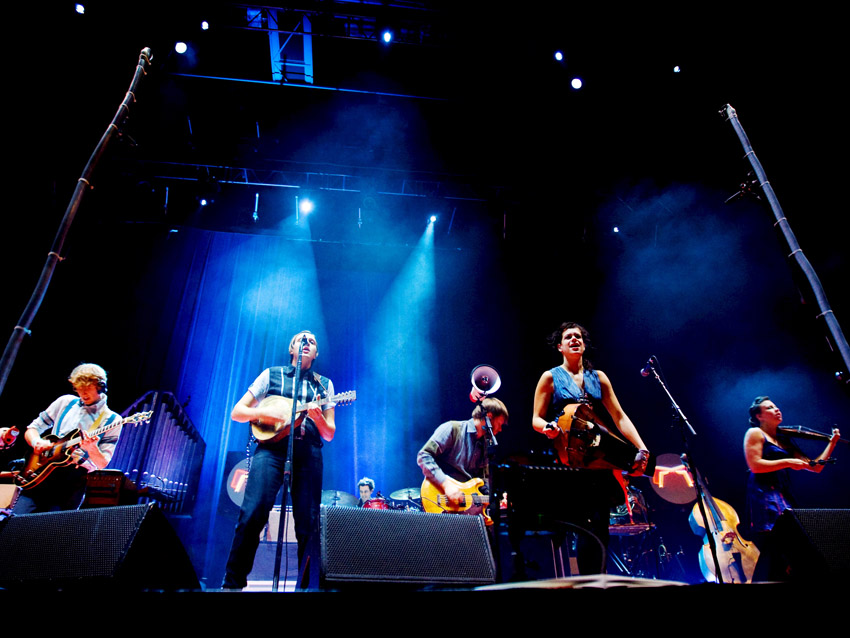
The Suburbs
When Arcade Fire snuck this track into independent record stores as a 12” single earlier this year, backed by b-side Month Of May (which we’ll come to in 10 tracks time), we were a little under-whelmed.
The piano chords/strummed acoustic/palm-muted electric combination gives the track a nice alt-country rhythm, reminiscent of US indie-stalwarts Spoon. Yet we couldn’t shake the feeling that for a lead single by Arcade Fire - a band known for their grandiose, emotional arrangements - this all felt a little, well, understated.
But first impressions can be misleading. For one thing the track is undoubtedly a grower; the kind of song that gradually gets under your skin as you notice there’s much more too it than first meets the eye.
For another, The Suburbs works far better in the context of the album than it does left to its own devices on a 12”.
Lyrically, Win Butler sets up some of the fantastic suburban imagery that is a running theme across the record (“All of the houses they built in the ‘70s finally fall”). Musically, it’s a great intro and sounds 10 times better when allowed to flow into the track that follows it…
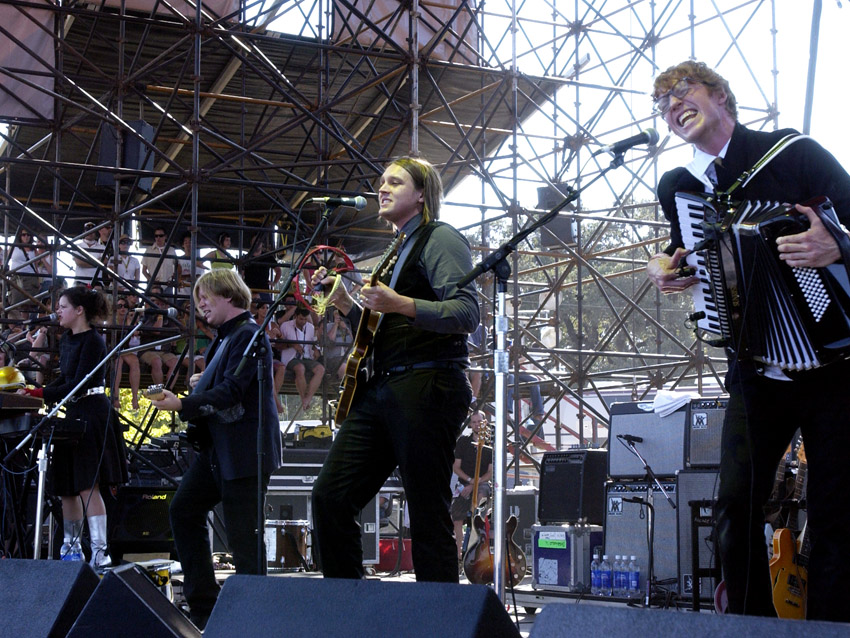
Ready To Start
This is where The Suburbs really gets going. An eerie, hanging violin note and reverb heavy, single-note guitar line give way to a driving punk rhythm on the drums and bass.
This rhythm section has an urgency to it last seen on Neon Bible stand-out No Cars Go (a track which had already appeared on the band’s debut EP).
A few months back the band hinted that this album was going to have a slight synth-pop influence to it and Ready To Start is the first time we see Arcade Fire using synth sweeps to create atmospheric sounds in place of their more traditional violins.
As the track goes on the guitars give way to a synth bass breakdown before slowly building back into a crescendo ending.
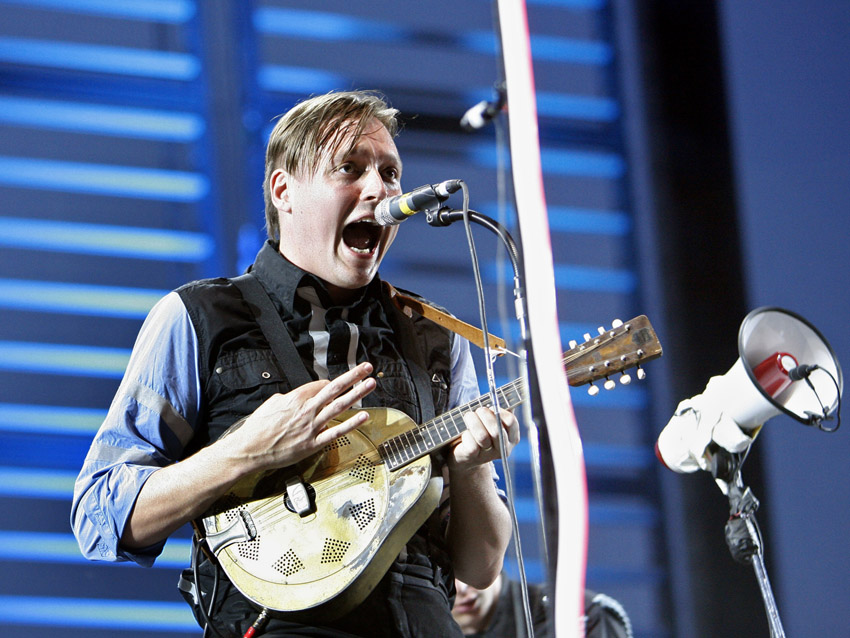
Modern Man
As with the eponymous opening track Modern Man is a relatively stripped back, guitar-led rock affair.
The extra layers of instrumentation are still there but they sit in the background, more as additional touches of production than as lead instruments.
Think Hunky Dory era Bowie working from Tom Petty’s song book. Kind of.
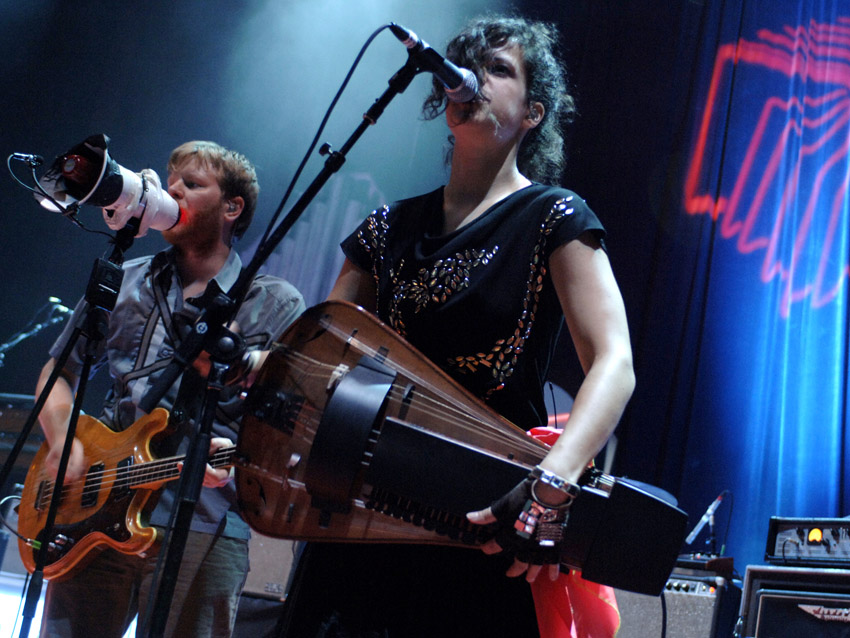
Rococo
Rococo is classic Arcade Fire, and it’s them at their musical best.
An acoustic guitar and distorted bass repeat a simple chord progression throughout while a multitude of other instruments and backing vocals flutter in-and-out adding regal, chamber pop melodies.
While a lot of The Suburbs is breaking new ground for the band, Rococo feels more like it bridges the gap between Funeral and Neon Bible. Not quite reaching for the majesty of the latter yet not rushing along at the pace of many of the bigger tracks from their first album.
Instead it’s happy to let itself unfurl at a more relaxed pace, allowing the string, horn and vocal melodies to reveal themselves slowly.
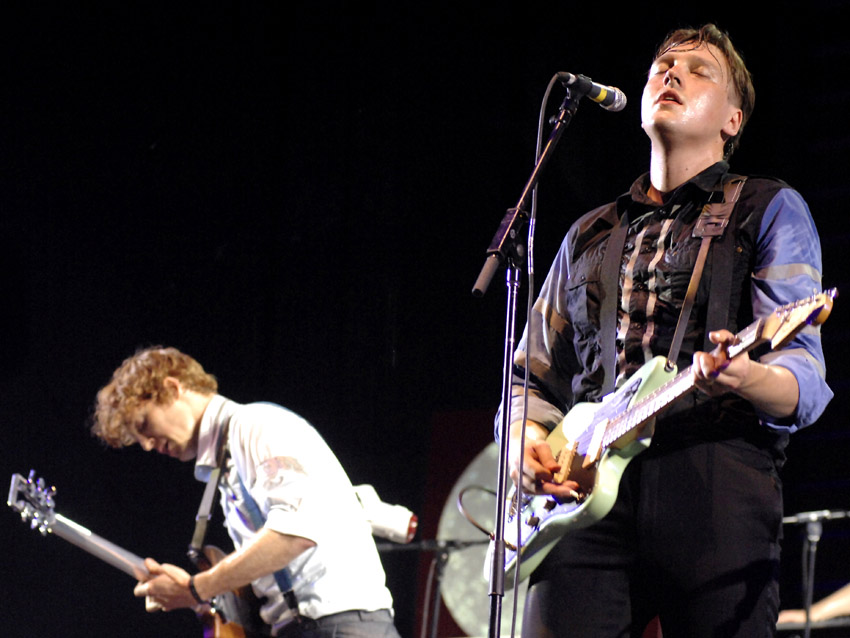
Empty Room
Another thickly layered number with a fairly punk rock feel to it.
A few seconds of break-neck baroque violin lead the song off before being joined by meaty, down-stroke guitar chords.
Guitarist Richard Reed Parry provides the lead melody by the way of some screeching pitch-bends buried under layers of reverb and distortion. It's also the first time on the album that vocalist Régine Chassagne takes the lead vocal, with Butler backing up her every word.
However, at times Empty Room feels a little like Arcade Fire by numbers and lyrically it's one of the album's less exciting tracks. It’s certainly no dud but it is one of The Suburbs’ less memorable moments.
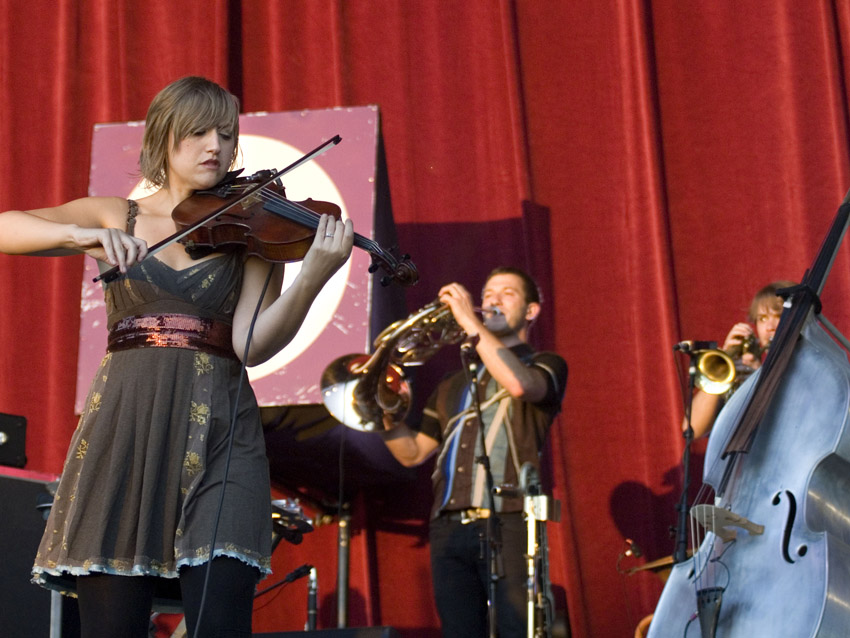
City With No Children
If Empty Room was lyrically forgettable then City With No Children immediately makes up for that.
Musically speaking, simplicity is the name of the game here, allowing Win Butler’s vocals to really come to the forefront. Butler wonderfully conjures up images of loneliness via memories of his suburban upbringing.
Here, for the first time, we really start to get a feel for The Suburbs as a conceptual, thematically consistent record. It’s one of Butler’s finest lyrical moments since Funeral’s glorious Neighbourhood #1.
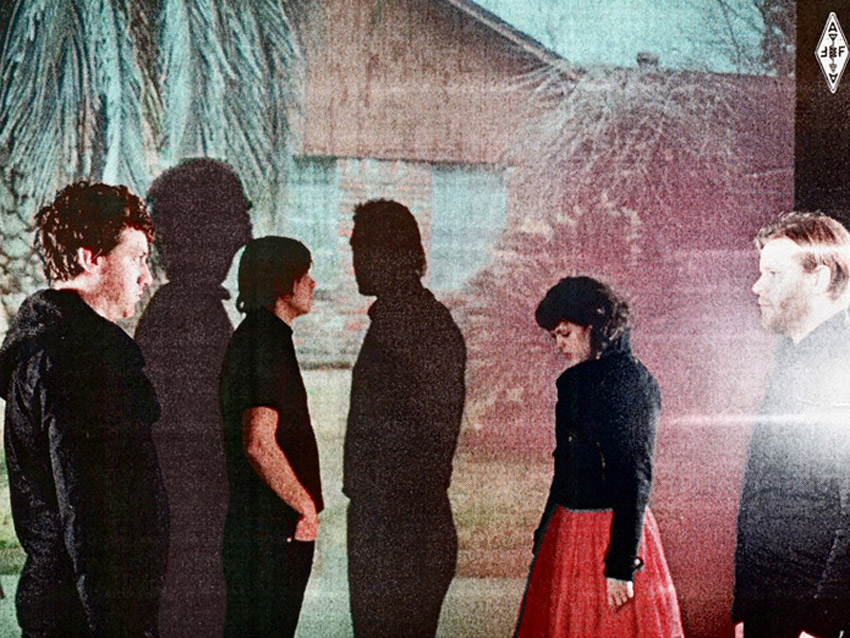
Half Light I
The opening to Half Light I sounds oddly like an orchestral take on The Clash’s Straight To Hell.
That aside, once it gets going Half Light has the Wall of Sound feel of a Phil Spector produced love song. Win and Régine share vocal duties, trading off stories of revisiting half-remembered neighbourhoods.
The vocals will suck you in enough that we guarantee it won’t be until the third or fourth listen that you notice just how fantastic the string arrangements are on this one.
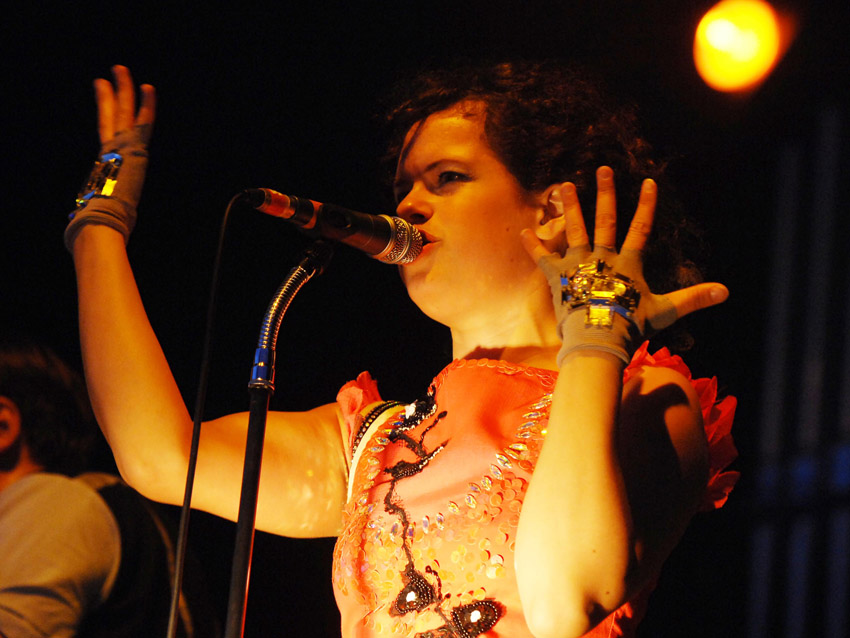
Half Light II (No Celebration)
Remember how we briefly mentioned synth-pop back with track two? Well, Half Light II is the song where that side of things really begins to rear its head.
There’s a synthesised bassline running throughout the song that sounds like it could have been pinched from a Gary Numan record while the bass drum keeps a steady four-to-the-floor beat.
We’re not entirely convinced by this little sidestep into electro though. With the reverb heavy guitars that play over the bass rhythm Half Light II actually reminds us a little too much of U2. And that's a look that doesn't suit this band particularly well.
Oddly enough, while Arcade Fire managed to sound very current and contemporary while using traditional instruments, as soon as they break out these synths they start to sound a little dated.
Fortunately, Win Butler keeps the lyrical treats coming, so we’ll let U2 comparisons slide… for now.
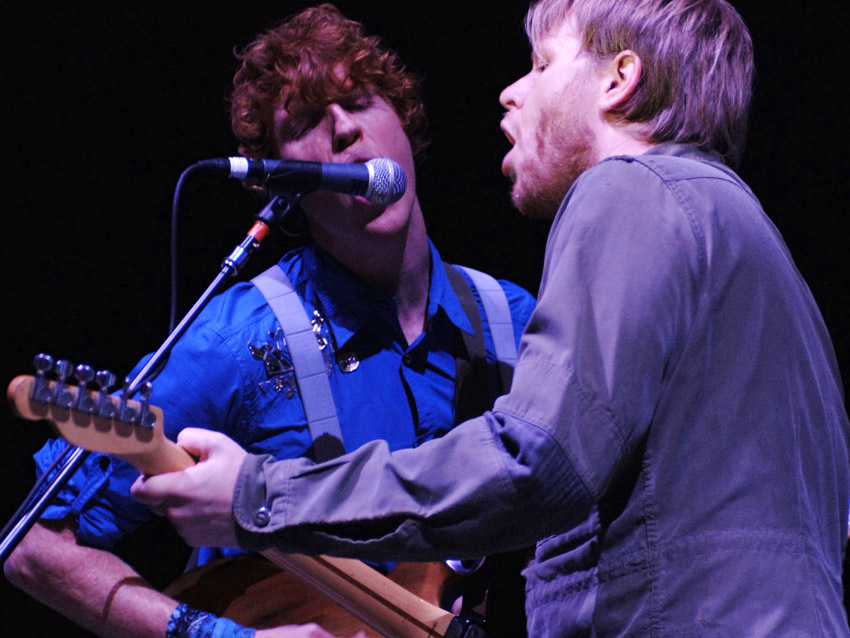
Suburban War
“The cities we live in could be distant stars/I search for you in every passing car…”
Suburban War is a nice example of what Arcade Fire have got really good at with this third album. It’s a downbeat, mid-tempo rock song. Win Butler conjures up more images of suburban loneliness while Richard Parry’s guitars - pulled back in the mix and almost lost amongst reverb - complement his words perfectly.
Throw in a classic Arcade Fire gear-shift outro (see also: Wake Up, Black Wave/Bad Vibrations) and you’ve got one of The Suburbs’ finest moments.
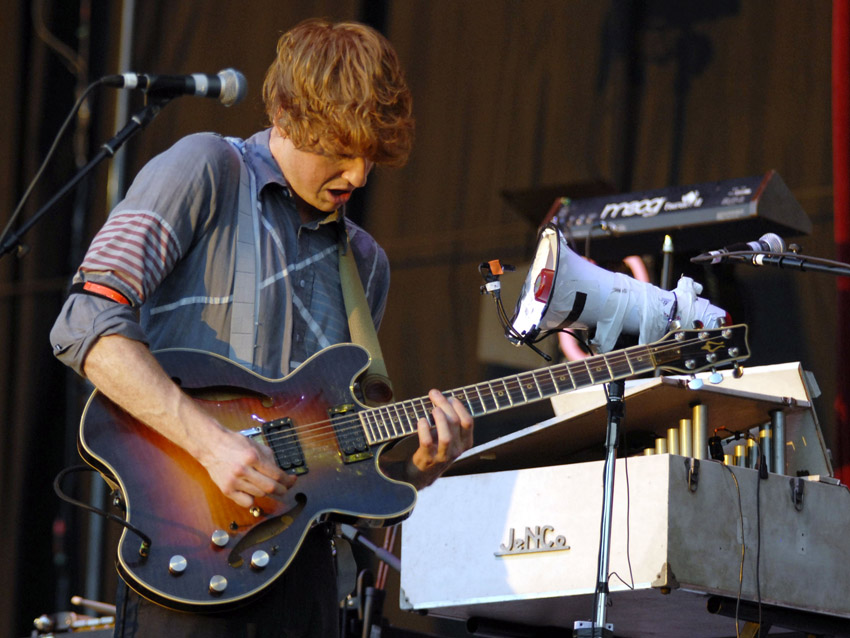
Month Of May
Month Of May first appeared as the b-side of The Suburbs 12” single that Arcade Fire released earlier this year. This was probably intended to confound expectations a little.
Month Of May is Arcade Fire’s most out-and-out punk rock excursion to date. The band has always flirted heavily with post-punk influences but this is proper three-chord, first wave stuff - Arcade Fire do Stiff Little Fingers. Almost.
It’s a pretty great deviation too; those choppy, Telecaster-sounding, power chords would make Joe Strummer proud. Meanwhile, Drummer Jeremy Gara seems to be channelling the spirit of The Stooges’ Fun House.
For all its retro charm the vocals keep Month Of May up-to-date (“Two-thousand nine/Two-thousand ten/I want to make a record/About how I felt then…”) and make nice little references to lyric themes from tracks two and three (“The kids are still standing/With their arms folded tight…”).
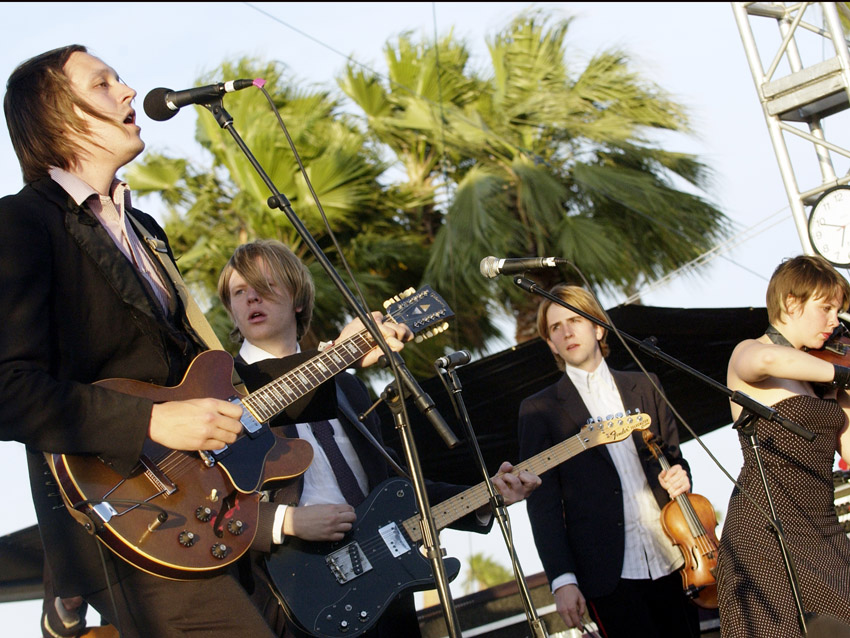
Wasted Hours
Wasted Hours returns to the alt-country rhythm of The Suburbs’ opening track.
There are certainly comparisons to be drawn to such US-based indie bands as Wilco or cult Pavement offshoot Silver Jews. Bands that put a lot of emphasis on lyrical prowess and bluesy, countrified acoustic guitar sounds.
As with Modern Man this is surprisingly minimal rock song territory for Arcade Fire. Far from revolutionary in the grand scheme of things but this is a side of the band that we hadn’t seen much of before The Suburbs. They do it well too.
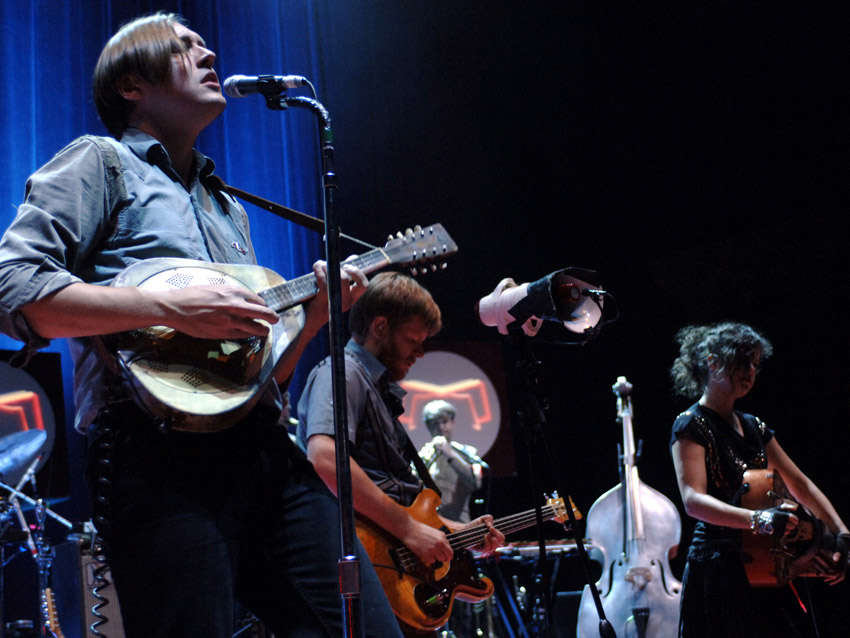
Deep Blue
Deep Blue once again conjures up comparisons to Hunky Dory/Ziggy Stardust era Bowie. And that can never be a bad thing.
Case in point - the piano riff, the strummed acoustic guitar, the phased electric and the delayed snare drum on the intro. All very Bowie-esque tricks, and all used very well here. Plus the lyrical shift into the realms of the intergalactic - talk of dying stars - could be construed as a nod to Mr Stardust. Maybe.
Either way the Bowie comparisons aren’t too surprising; both parties have admitted to having a mutual admiration of each other, resulting in a fantastic collaboration at the Fashion Rocks event back in ’05.
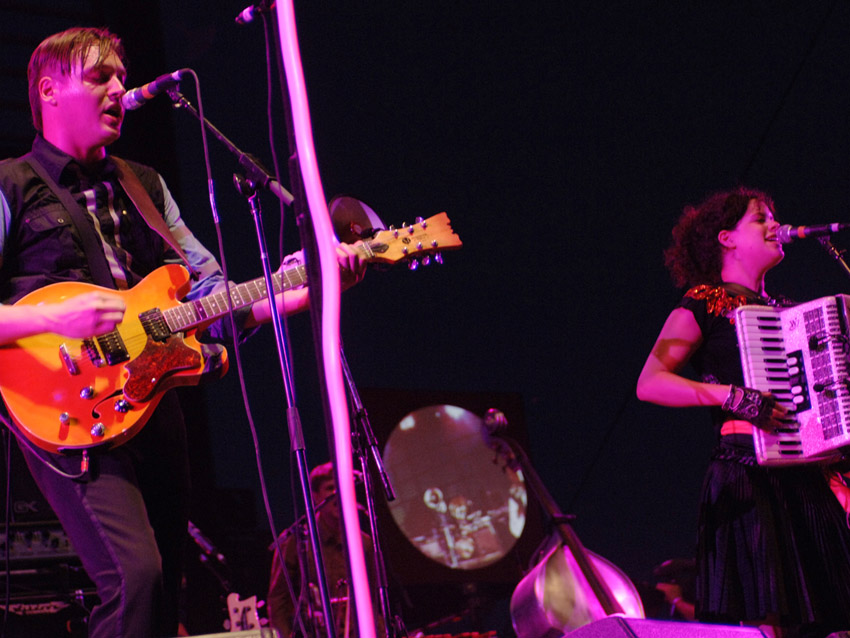
We Used To Wait
If there’s one thing worth knowing about We Used To Wait it’s that it has The Suburbs’ best chorus. Between verses that have a sense of pre-apocalyptic urgency Butler turns the track’s title into a catchy-as-hell pop hook.
Musically it’s dominated by Jerry Gara’s drumming - all forceful kicks and snares EQ'd to sound like handclaps - and Tim Kingsbury’s driving bassline, which achieves a lovely fuzzy kind of distortion as it peaks.
It’s not hard to imagine this track proving a highlight of the band's festival sets this summer.
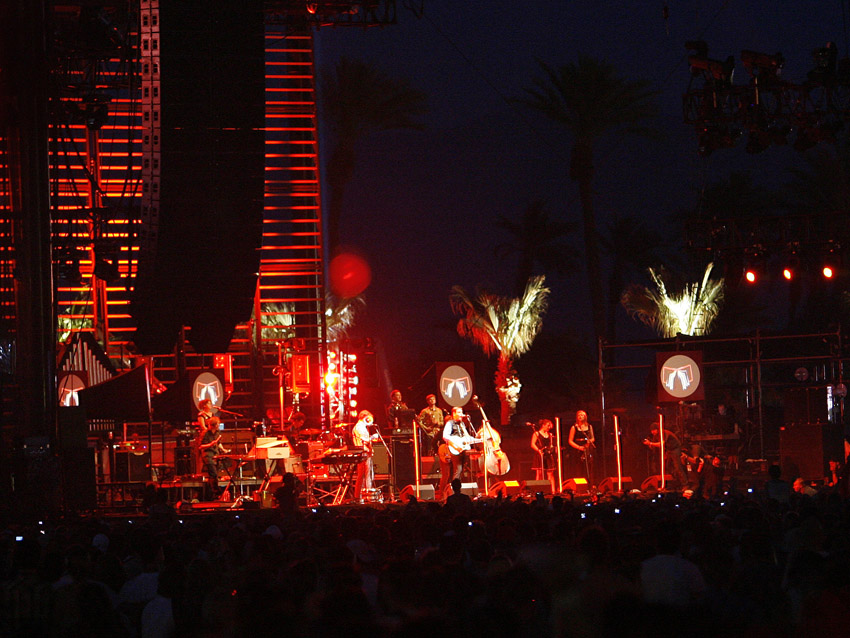
Sprawl (Flatland)
Both lyrically and musically this is The Suburbs’ most morbid moment. We’re talking downright macabre theatrics here.
The cello-triplets and tremolo violins sound like something out of one of Hans Zimmer’s film scores while Butler’s lyrics - the “loneliest day of my life” as “last defender of the sprawl” - couldn’t possibly be more downbeat.
It feels like the beginning of the end, both in terms of The Suburbs’ relatively cryptic narrative ark and in its sense of looming dread for what is to come…
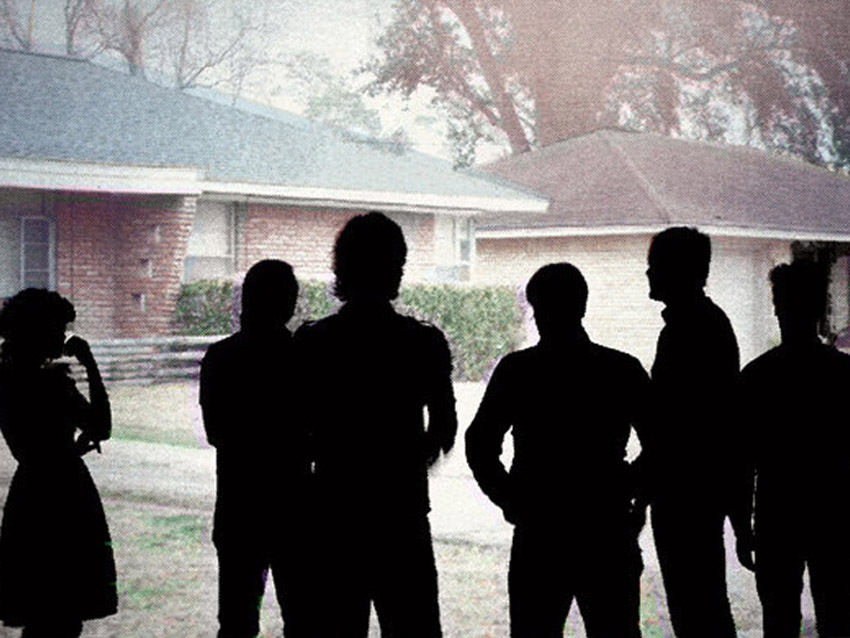
Sprawl II (Mountains Beyond Mountains)
…so Sprawl II, a track that sounds like the poppier moments of ‘80s Kate Bush mixed with hints of The Human League, comes as a bit of a surprise.
It sort of makes sense if you think of The Sprawl II as Regine’s response to Win’s previous effort. At least lyrically.
Those electro synths are certainly back with a vengeance - very ‘80s, very retro, very analogue. Again, the effect is to make it still sounds oddly dated compared to the majority of The Suburbs.
Although that’s not necessarily a bad thing this time. Sprawl II is certainly a great little gem of a pop song, albeit one that you’d expect to find tucked away in a faded 7” sleeve in your local charity shop rather than on a new Arcade Fire album.
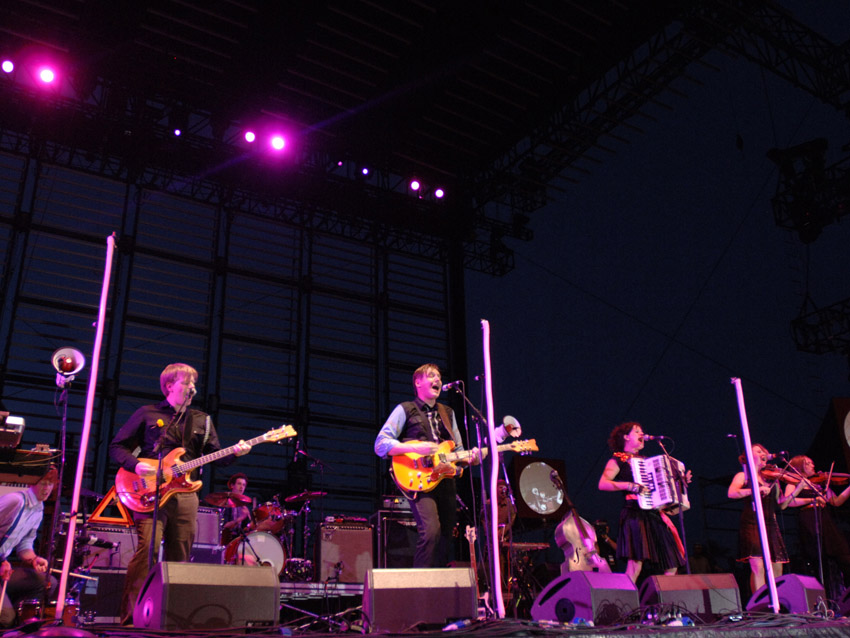
The Suburbs (Continued)
And so on to the album’s final track, a downbeat, stripped-back reprise of the record’s opening.
Clocking in at just over a minute in length The Suburbs (Continued) takes the refrain from its namesake, strips it of any sense of optimism and repeats until the fade out.
If you hadn’t picked up on The Suburbs being a bit of a concept record by now (which you really probably should have) then this thematic book-ending should help to hammer the point home. A nicely constructed ending.
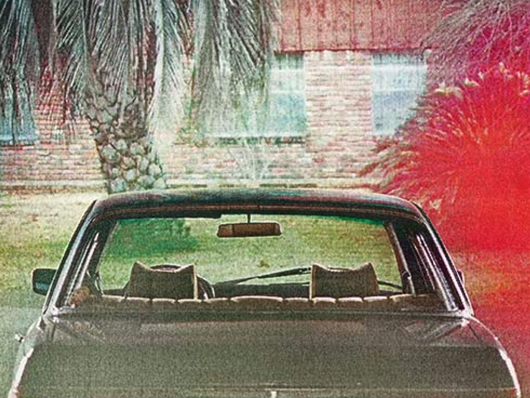
Verdict
The Suburbs is by no means perfect, but it is certainly a very good album. Taken piece-by-piece there are moments that don’t quite work but, as a whole, things level out to be pretty great.
It’s definitely a grower. There’s nothing in there that’s going to blow you away on your first listen. But give it a few plays and you’ll be rewarded as you get a feel for how well the music complements the lyrical themes.
The Suburbs’ is probably Arcade Fire’s most daring record to date; in places very new and forward thinking while very retro elsewhere. At times the band’s new found penchant for retro sounds falls flat (Half Light II) by when they get it right (Month Of May, Sprawl II) these nods to bygone decades are some of their most enjoyable moments to date.
It takes a lot of effort to resist the urge to compare everything to their debut record, but it’s best to leave the comparisons to Funeral behind. The Suburbs is a strong, and very different offering in its own right.
Certainly at least an 8 out of ten - catch us on a good day and we might even stretch that to a 9.
I'm the Managing Editor of Music Technology at MusicRadar and former Editor-in-Chief of Future Music, Computer Music and Electronic Musician. I've been messing around with music tech in various forms for over two decades. I've also spent the last 10 years forgetting how to play guitar. Find me in the chillout room at raves complaining that it's past my bedtime.